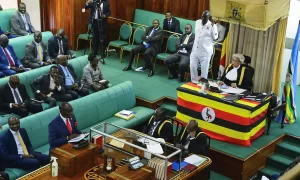After the Court ruled against Parliament’s decision to impeach Francis Zaake from the position of Parliamentary Commissioner, some pundits started weighing in on Parliament workings including blaming its leadership.
Whereas it would be ideally important for Parliament to make decisions that can’t be challenged in Courts of law, it is inevitable that one or two decisions can be found to be wrong for one reason or the other. This does not necessarily mean that Parliament is not doing a significant job in the management of affairs of this country.
In any case, the reason we have all the three arms of government namely; Executive, Judiciary and Legislature checking one another is a recognition that there can always be errors or ommissions. They therefore serve to address any mistakes should they happen. It is therefore a delusion to think that Parliament or any other institution is 100 percent perfect and therefore cannot make errors. For the sports lovers you must have seen the recent cancelled Liverpool goal against Manchester City which they said was a “human error”, it simply shows that even with advanced technologies, human beings can make mistakes!
I saw some trying to personalize or politicize the decision to impeach Zaake on the person of Hon Anita Among. But there are many decisions of Parliament or laws that have been quashed by the Constitutional Court dating back from the previous Parliaments long before Hon Among was even an MP.

MPs in session
courtesy photo
In 2014, the Constitutional Court cancelled the Anti-homosexuality law on the basis that it was passed without quorum, this was the 9th Parliament. In 2023, the Constitutional Court found Section 8 of the Public Order Management Act 2013 as unconstitutional, the same law was passed by the ninth Parliament. In 2022 the Constitutional court nullified section 168 (1) (c and d) of the Penal Code Act that creates an offence commonly known as being Idle and disorderly. This law had been in place since 1950 and was ratified by the 6th Parliament after the new constitution was made.
In 2023, the Constitutional Court nullified the Narcotic Drugs and Psychotropic Substances (Control) Act, 2016. This law was passed by the 10th Parliament but the Court said it was unconstitutional because it had been passed without quorum. In 2005 the Constitutional Court nullified section 32 (2) of the Police Act in the famous Muwanga Kivumbi vs Attorney General case.
What does this mean therefore? It means that MPs can make a decision which is appropriate in their wisdom, and for any reason the Constitutional Court may find it wrong. Similar things happen in Courts with higher courts overturning rulings of lower courts. Does that suggest that judges whose decisions are challenged or overturned at an appeal are incompetent? In any case judiciary is also having its own challenges.
Therefore, in conclusion, if any decision of Parliament is challenged, it is an opportunity to improve and therefore it should never cause alarm. It’s part of the process to grow.
georges2010ug@gmail.com







